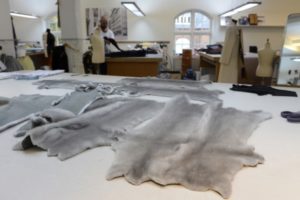By Jonathan Stempel
 (Reuters) – A U.S. appeals court on Wednesday rejected a challenge by two animal rights activists to the constitutionality of a federal law used to prosecute them for breaking into an Illinois farm and releasing more than 2,000 minks into the wild.
(Reuters) – A U.S. appeals court on Wednesday rejected a challenge by two animal rights activists to the constitutionality of a federal law used to prosecute them for breaking into an Illinois farm and releasing more than 2,000 minks into the wild.
The 7th U.S. Circuit Court of Appeals in Chicago refused to dismiss the indictment and conditional guilty pleas of Kevin Johnson and Tyler Lang for violating the Animal Enterprise Terrorism Act in connection with the August 2013 incident.
Prosecutors said Johnson and Lang, both from California, broke into a Morris, Illinois farm that raised minks for sale to fur makers, removed fencing to help them escape, destroyed cards to identify their breed, and spray-painted “Liberation is Love” on a barn, causing between $120,000 and $200,000 of damage.
Writing for a three-judge panel, Circuit Judge Ann Claire Williams said the 2006 law did not violate the First Amendment by criminalizing speech or conduct that causes damage only to an animal enterprise’s profits or goodwill.
She also rejected the defendants’ claim that the law’s name deprived them of due process by effectively branding them “terrorists” for their non-violent activity.
“Congress was concerned about actions by extremists such as arson and bombings. Both of those crimes involve destruction of property and are extremely violent,” Williams wrote. “The word ‘terrorism’ certainly bears a rational relationship to many of the acts covered by [the] AETA.”
Rachel Meeropol, a lawyer for Johnson and Lang, said in an email it was unfair to punish “activists who liberate animals destined for a violent death.”
She noted the court’s finding that the law likely could not be used in a separate case to prosecute a man who “for no reason” broke into a shed and clubbed 900 chickens to death.
“It is protestors who are under attack,” said Meeropol, who works at the Center for Constitutional Rights in New York.
The office of Acting U.S. Attorney Joel Levin in Chicago did not immediately respond to a request for comment.
Johnson was sentenced to three years in prison, and Lang was sentenced to six months of home confinement plus six months in a work release center, pending their appeals of the indictment.
The case is U.S. v. Johnson et al, 7th U.S. Circuit Court of Appeals, Nos. 16-1459, 16-1694.
(Reporting by Jonathan Stempel in New YorkEditing by Marguerita Choy)

